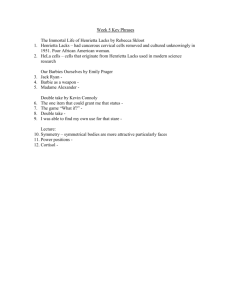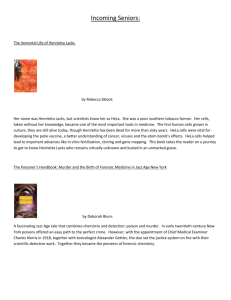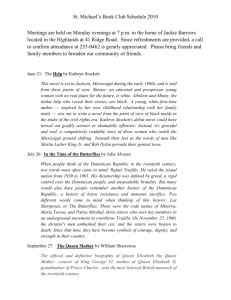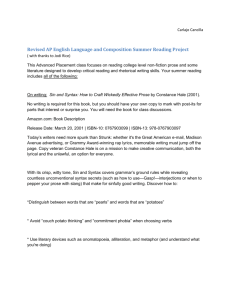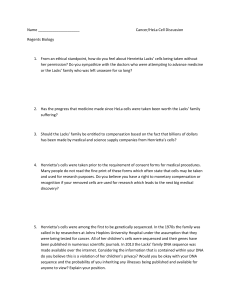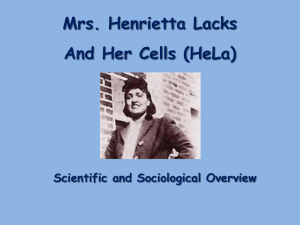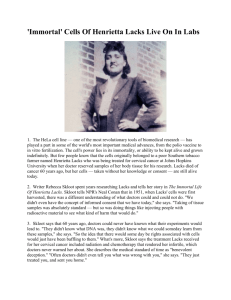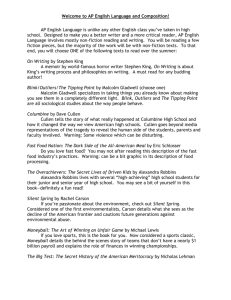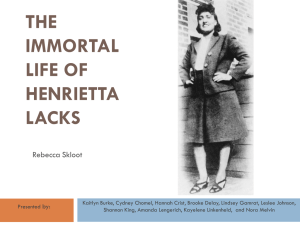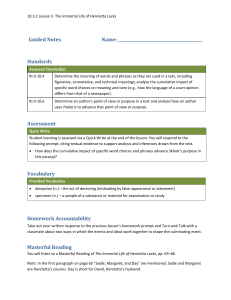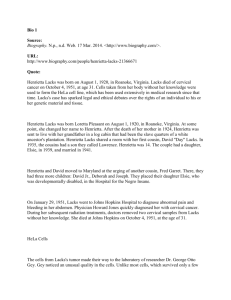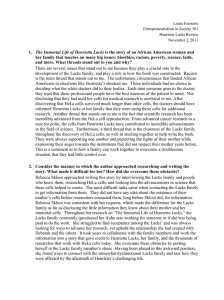Discussion and reflection questions for The Immortal Life
advertisement
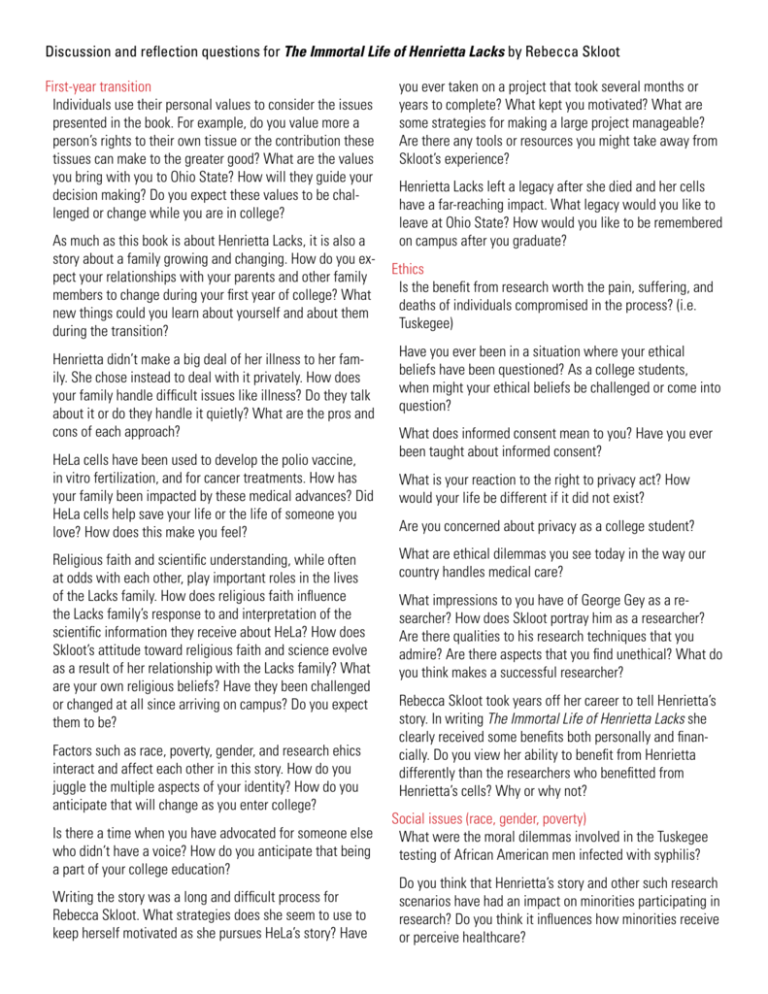
Discussion and reflection questions for The Immortal Life of Henrietta Lacks by Rebecca Skloot First-year transition Individuals use their personal values to consider the issues presented in the book. For example, do you value more a person’s rights to their own tissue or the contribution these tissues can make to the greater good? What are the values you bring with you to Ohio State? How will they guide your decision making? Do you expect these values to be challenged or change while you are in college? As much as this book is about Henrietta Lacks, it is also a story about a family growing and changing. How do you expect your relationships with your parents and other family members to change during your first year of college? What new things could you learn about yourself and about them during the transition? Henrietta didn’t make a big deal of her illness to her family. She chose instead to deal with it privately. How does your family handle difficult issues like illness? Do they talk about it or do they handle it quietly? What are the pros and cons of each approach? HeLa cells have been used to develop the polio vaccine, in vitro fertilization, and for cancer treatments. How has your family been impacted by these medical advances? Did HeLa cells help save your life or the life of someone you love? How does this make you feel? Religious faith and scientific understanding, while often at odds with each other, play important roles in the lives of the Lacks family. How does religious faith influence the Lacks family’s response to and interpretation of the scientific information they receive about HeLa? How does Skloot’s attitude toward religious faith and science evolve as a result of her relationship with the Lacks family? What are your own religious beliefs? Have they been challenged or changed at all since arriving on campus? Do you expect them to be? Factors such as race, poverty, gender, and research ehics interact and affect each other in this story. How do you juggle the multiple aspects of your identity? How do you anticipate that will change as you enter college? Is there a time when you have advocated for someone else who didn’t have a voice? How do you anticipate that being a part of your college education? Writing the story was a long and difficult process for Rebecca Skloot. What strategies does she seem to use to keep herself motivated as she pursues HeLa’s story? Have you ever taken on a project that took several months or years to complete? What kept you motivated? What are some strategies for making a large project manageable? Are there any tools or resources you might take away from Skloot’s experience? Henrietta Lacks left a legacy after she died and her cells have a far-reaching impact. What legacy would you like to leave at Ohio State? How would you like to be remembered on campus after you graduate? Ethics Is the benefit from research worth the pain, suffering, and deaths of individuals compromised in the process? (i.e. Tuskegee) Have you ever been in a situation where your ethical beliefs have been questioned? As a college students, when might your ethical beliefs be challenged or come into question? What does informed consent mean to you? Have you ever been taught about informed consent? What is your reaction to the right to privacy act? How would your life be different if it did not exist? Are you concerned about privacy as a college student? What are ethical dilemmas you see today in the way our country handles medical care? What impressions to you have of George Gey as a researcher? How does Skloot portray him as a researcher? Are there qualities to his research techniques that you admire? Are there aspects that you find unethical? What do you think makes a successful researcher? Rebecca Skloot took years off her career to tell Henrietta’s story. In writing The Immortal Life of Henrietta Lacks she clearly received some benefits both personally and financially. Do you view her ability to benefit from Henrietta differently than the researchers who benefitted from Henrietta’s cells? Why or why not? Social issues (race, gender, poverty) What were the moral dilemmas involved in the Tuskegee testing of African American men infected with syphilis? Do you think that Henrietta’s story and other such research scenarios have had an impact on minorities participating in research? Do you think it influences how minorities receive or perceive healthcare? Discussion and reflection questions for The Immortal Life of Henrietta Lacks continued What is your reaction to a white woman telling the Lacks family story? What does it mean for a non-member of a family to tell that family’s story? What can we learn from this about cross-cultural dialogue with others who might be different from us? Why do you think there was so little initial media attention given to the cells? How did race and gender influence the lack of attention given to Henrietta from the local, regional, and national media—even as her medical story was being revealed? How did the lack of education in the Lacks family cause them to be more vulnerable? What healthcare struggles do impoverished families face today? What role did the deferential attitude toward doctors in the early twentieth century play in the interaction between Henrietta and her family and Johns Hopkins? How has that attitude toward doctors changed over the decades? Do patients’ socioeconomic differences affect the relationship today? Deborah says, “But I always have thought it was strange, if our mother cells done so much for medicine, how come her family can’t afford to see no doctors? Don’t make no sense” (page 9). Should the family be financially compensated for the HeLa cells? If so, who do you believe that money should come from? Do you feel the Lacks family deserves health insurance even though they can’t afford it? How would you respond if you were in their situation? Do you think the author’s gender helped her write the story and connect with the Lacks family? Do you think that collegiate women today are educated on how to take care of their bodies? Do you feel educated on how to take care of your body? Research Rebecca first hears about this story in a biology class. Have you heard anything in one of your classes that would inspire you to learn more or do independent research? After reading this story, what considerations might you take in your future research that you had not thought about before? Explain. How does today’s research environment (in the United States) protect individuals from any such breeches of the regulations and/or ethical principles? What are the benefits from participating in research? Why do you think some research projects provide inducements and/or compensation? While individuals may not receive any direct benefit from participating in research, they may incur risks. How can these risks be minimized? If you saw a flyer about a research study that needed healthy volunteers would you call the study staff to find out more about participating? What if your physician approached you and suggested that you might be a good candidate for this same study? Would you be more likely to consider participation? Why or why not? Journalism and writing The book is written as creative nonfiction, where all facts are accurate and verifiable, but are presented through the use of scenes, dialogue, and other writing techniques found in fiction. Did you like this writing style? How does it differ from traditional journalism? This is a story with many layers. Though it’s not told chronologically, it is divided into three sections: Life, Death, and Immortality. Discuss the significance of the titles given to each part. How would the story have been different if it were told chronologically? As a journalist, Skloot is careful to present the encounter between the Lacks family and the world of medicine without taking sides. Since readers bring their own experiences and opinions to the text, some may feel she took the scientists’ side, while others may feel she took the family’s side. What are your feelings about this? Does your opinion fall on one side or the other, or somewhere in the middle? Why? Skloot took it upon herself to learn the story of the woman behind the HeLa cells. Do you feel that you now have a sense of who Henrietta Lacks was? How does Skloot make her story come alive? What strategies does Skloot use to relate the Lacks family story to you as a reader? Discussion and reflection questions compiled from the following resources: • emmanuel.edu • faculty.ccbcmd.edu/cbc • ncsu.edu/uap/reading/ • rebeccaskloot.com • tjhsst.edu
